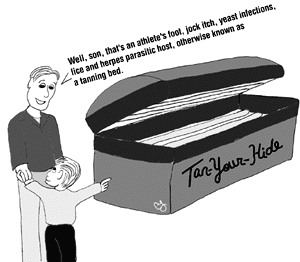|
Pale
skin puts best side forward Never in my life have I been more proud to be pale. Suddenly, an aspect of my physical appearance that’s been a source of uneasiness for years has become a distinguishing quality I can be pleased with. After reading
the Sunday’s Fort Worth Star-Telegram, I realized the risks
definitely outweigh the results. I always knew about the increased
chances of getting skin cancer and the skin-aging effects that indoor
tanning can cause. For these reasons, and because of a complete
lack of income, I always avoided conforming to the social pressure
of paying for a nice tan. However, I never even considered the other dangers that indoor tanning presents. According to the Star-Telegram’s review of Texas Department of Health inspection records of Tarrant County tanning salons for the past three years, all 42 inspected salons violated state regulations, and 39 of them were cited for serious health violations. Most of these salons are repeat offenders. Also, 23 of 25 salons that went out of business in the past three years had a history of serious health violations. The basic gist of these violations is that tanning salons do a very poor job of cleaning tanning beds. Among other serious infringements was cracked acrylic on a bed, and the failure to provide clean protective eye wear, which can lead to cataracts and eye infections. The acrylic serves as a filter for the ultraviolet radiation, and the customer is receiving the ultraviolet light at full strength when it’s cracked, which can cause serious second and third-degree burns. My favorite aspect of the violations is how unclean tanning beds can spread disease. Not only can they spread athlete’s foot, jock itch, yeast infections, lice and various other funguses, but they have been known to spread herpes as well. In the article, Brett Coldiron, professor of dermatology for the University of Cincinnati, said ultraviolet light kills immune cells for herpes and people can unknowingly shed the disease when lying on tanning beds. For those lucky few, some customers may even be paying for both lice and herpes in one sitting. After all, I never have been able to pass up a two-for-one special. On an optimistic note, at least people can blame their fever blisters on their tanning experiences and not their social ones. I was once somewhat embarrassed to go shirtless in public, but now I can laugh at all of the perfectly tanned people and their concealed funguses and infections. Sure, my pasty skin tone may not be very pleasing to the eye, but at least it doesn’t burn when I urinate. This is why I propose people stick with natural sunlight and suntan lotion instead of resorting to costly, in more ways than one, fake baking. Even if people don’t have a great deal of time to lay out in the sun, I’m pretty sure just having a moderate tan outweighs the risk of cancer, burns and aforementioned diseases. What may be even more important for some other than their health is that you save money by sticking with natural tanning methods as well. After all, I can’t remember the last time I was laying poolside and thought to myself, “Gee, I hope I don’t catch any venereal diseases lying out here.”
Editorial policy: The content of the Opinion page does not necessarily represent the views of Texas Christian University. Unsigned editorials represent the view of the TCU Daily Skiff editorial board. Signed letters, columns and cartoons represent the opinion of the writers and do not necessarily reflect the opinion of the editorial board. Letters to the editor: The Skiff welcomes letters to the editor for publication. Letters must be typed, double-spaced, signed and limited to 250 words. To submit a letter, bring it to the Skiff, Moudy 291S; mail it to TCU Box 298050; e-mail it to skiffletters@tcu.edu or fax it to 257-7133. Letters must include the author’s classification, major and phone number. The Skiff reserves the right to edit or reject letters for style, taste and size restrictions. |
The TCU Daily Skiff
© 1998, 1999, 2000, 2001
Web Editor: Ben Smithson
Contact Us!

